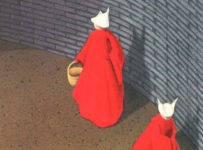
Thomas Harris' first novel since 2006, first not written under duress since 1999, and first not featuring Hannibal Lecter since 1975, is a strange book, fleet of foot and overburdened of character. Cari Mora is a fondue pot of a novel: disparate elements covered in cheese, bubbling to the top at random intervals and vying for the attention of a wary reader. That sentence was less tortured than some of the prose in Cari Mora.
Cari Mora is a Colombian refugee scraping by in Florida. One of her jobs sees her fall into the orbit of Hans-Peter Schneider, a completely hairless pervert on the hunt for Pablo Escobar's gold. As Cari reflects upon her time as a child soldier, Hans-Peter has designs on her flesh. Representatives of multiple secret and criminal societies intersect on both sides of the fracas, but Cari Mora is always at a slight remove.
Cari Mora is a scant novel of barely any duration, packed with a ridiculously large cast of minor significance. Realistically it's a two-hander masquerading as a giant squid. Cari Mora herself is well-drawn, although the minutiae of her backstory is largely irrelevant and only once poetically linked to the life that she is currently living. Anyone who reads the book — and they don't even need to finish it for this — will get stuck on Hans-Peter. In the fourth chapter we learn of his penchant for liquid cremation of women that he is finished with, and the commercial jingle that he has devised for his disposal service:
"Call Hans-Peter—that's the name!—and away go troubles down the drain—Hans-Peter!â€
Certainly, Harris is the creator of one of the most iconic psychopaths of all time in Hannibal Lecter, but Francis Dolarhyde and Buffalo Bill were memorable villains in themselves. Hans-Peter is memorable, for all the wrong reasons. Continuing his taste for depravity for its own sake introduced in the thoroughly unpleasant Hannibal, Harris layers villainy on the man with a trowel. If there's something bad that can be done to a woman, Hans-Peter will commit it; if there's someone that he can double-cross, he will quadruple-cross them just for fun. Everything the man does feels gratuitous, but not in a camp way or in a way that lends depth to his evil.
The rest of the cast get brief moments on the page, either auditioning their own books, or having bizarre interludes about manufacturing artificial snail meat (seriously). Most of them are near impossible to keep track of or remember their names, and they're a largely petty assortment of lesser or greater criminals with bad attitudes towards women. They come from backgrounds paradoxically too similar and diverse to follow. It's not that we want to know more about any of these people, but that there is too little real estate on the page to truly get a taste of any of them.
Harris' grasp of prose styling seems tenuous at best; much of the book seems to have been written in the most exotic of foreign languages and then machine translated back to the unwitting English reader. Most sentences are clunky and appear to reverse or ignore the rules of subjects, verbs and objects, and much of the dialogue would never escape the mouth of a real person. It's not that Hans-Peter is German—no one else has a grasp of natural English, either. Most of the book's action is parsable, at least, but one of the first major deaths is almost impossible to understand the mechanics of. This style of writing would not be able to sustain a longer novel—Cari Mora is barely more than a novella—and it doesn't exactly work here, but it doesn't last long enough to outstay its welcome. Further to that, Cari Mora practically ends mid-sentence.
Which means that Cari Mora does have something going for it: in places, it's quite funny. It's not intentional humour, but it helps to ease the passage of the passages. Cari Mora should be workable, as it's basically a novelisation of Geraldo Rivera's The Mystery of Al Capone's Vaults, but the jumble of characters, events, and prose conspire against it. There's a tiny bit of tenderness to the representation of title character, but the rest of the book is like wading through crocodile infested sewage. Hans-Peter Schneider is one of the great bad villains, but not so much that Cari Mora itself bends back around to good.
Cari Mora is a bizarre experiment in testing whether readers will pick up anything just because it was written by a 30 million book selling author. Thomas Harris is a cheerful man who potters about Florida and works at wildlife reserves in real life; he looks somewhat like George R.R. Martin without the weight of the world's expectations on his shoulders. Cari Mora incorporates that respect for wildlife but it does not represent cheeriness or any real insight into either the criminal mind or that of a tenuous refugee of some resourcefulness. Authors, once they're reached a certain point, are allowed to potter (except J.K. Rowling. Please stop, Joanne). No one would judge Harris if he returned to his opossums, but unfortunately Cari Mora is a prime candidate to be judged and found wanting.
 Featured image credit: Tambako the Jaguar.


